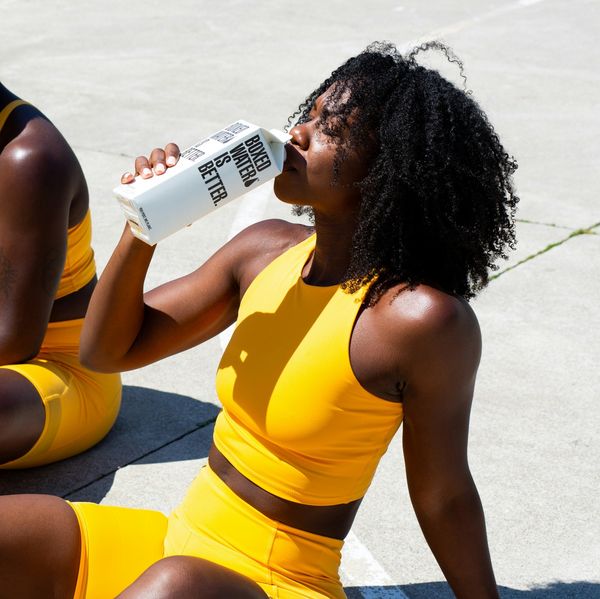
All things woo-woo (a term I'm choosing to use endearingly) have become far more trendy this past year or two. I mean, Astrology has always been popular as I've mentioned before but we're seeing people get more into all things spiritual, whether they're aware of its roots or not -- from wrapped crystals to smudging of sacred spaces (i.e. your home). I've never been one to gate-keep trends and have always found it weird that we get so protective over trends that, in my opinion, are on the healthier side of the way pop culture ebbs and flows to encompass new things.
However, as someone who is fascinated by the world of altars, Astrology, and much more, I have come to understand the need to be a bit protective of it. It's that saying "with great power comes great responsibility," and I think with spirituality trending the way it is it's important to understand that. Tapping into the power of your ancestors, reading tarot, purchasing sage and many more potentially interesting practices related to the occult, they require care and due diligence, in addition to intention. I don't know much, so this isn't my soapbox to hop up on but I do know enough to know if you want to maintain an altar, crystals, or good energy in your home -- the foundation is cleansing. Another method of cleansing energies from your home is through the use of Florida Water, which you can use alone or double up with incense or a smudge stick (not necessarily sage).

Florida Water is the spiritual girl's version of Beyoncé carrying hot sauce in her bag. In fact, Solange was once spotted with the staple in her bag. So there's that. But what is Florida Water?
I don't know nor do I ask questions (well, I do, otherwise we wouldn't be here. But you feel me), so I chatted with Atlanta-based, Intuitive Healer and owner of Cryptic Mystic, Tierra Johnson to get the 411 on Florida Water -- the latest and most necessary tool to keep in your little bag of tricks.
What Is Florida Water?

Though the aesthetic and usage is similar, Florida Water and Holy Water are not one in the same. Johnson understands it to be distinguishable by the purpose and the demographic behind it in that "Holy water is used in religious practices, while Florida Water is used mainly in spiritual practice."
Believe it or not, Florida Water wasn't always toted around to clear the bad juju and off-putting energies. Johnson gives us the quick and dirty origin of the holy-water adjacent product. When the product was "first introduced in 1808 by Lanman & Kemp, it was originally used as an astringent, foot soak, and after-shave. It is said to have gotten its name because of its tropical-looking packaging and citrus scent."
It was somewhere in between its societal debut and present-day, "people began to recognize its metaphysical properties, and it became used as a spiritual cologne in ceremonies and sacred rituals."
What Is Florida Water Used For & How To Use It
Because Florida Water is a liquid, it may be unclear how you would use it or how much! The Cryptic Mystic owner says, "Think of Florida Water as liquid Sage, or Palo Santo in liquid form. It has very similar cleansing and clearing effects as popular smudge sticks, without the smoke." She continued:
"Florida Water is a multipurpose spiritual cologne that can be added to your mop water to clean the floors in your home; you can add a few drops to your bath water to cleanse your aura; it can be added to a load of laundry; and [you can] even use [it] on the go."
And she adds that it can be used as often as you feel the need or simply desire to use it. However, as far as the measurement goes for each use, please understand that "a little Florida water goes a long way." What you decide to do is totally up to you, but you've been warned! Start with a droplet or two and build up from there.
As I've mentioned before, the scent of the water has been love at first sniff since day one for me and so I'm definitely more on the side of someone who douses my apartment in it. Or, my fave, is putting it in a pot with sticks of cinnamon and citrus slices to create a more amplified diffuser effect. As an intuitive healer, Johnson notes her favorite way to use Florida Water is "for intention-setting before I do any spiritual work."
She further expounded by saying she sprays Florida Water into the air as a means to cleanse her space. She also places a few drops onto her hands before doing divination work like pulling Oracle cards, for example. Nevertheless, the healer emphasizes Florida Water as a necessary staple for any person looking to tap more into their spirituality and spiritual practice:
"Florida Water is a staple that I feel like every spiritual person should have on them, in their purse, in their car, etc. It's especially useful when traveling and staying at a hotel or Airbnb, where smoke is generally not allowed. So, when you can't burn your Sage or Palo Santo, pour some Florida water into a portable spray bottle and dilute it with distilled or spring water."
Can You Make Your Own Florida Water?
Being the DIY Queen that I am, I had to ask for those of us who dare to whip up a batch of homemade Florida Water on our own. In the past, I might've thought that was perhaps doing the most, but in the age of 2021, where we've adopted pandemic hobbies to keep us afloat, I've already tried my hand at making Rose Water, and can't say for certain that I wouldn't entertain the idea of making my own Florida Water -- a fragrance I've come to crave in my home.
Nevertheless, it's totally doable! Though Johnson doesn't make her own and most others do not, professional or otherwise, she recommends taking to YouTube if you feel strongly about whipping up homemade Florida Water. But cautions us "to use your own discernment when following someone else's instructions."
In terms of following someone's DIY Florida Water tutorial, what works for someone else might not work for you. Be mindful of how you respond to certain essential oils and ingredients. Additionally, much like anything else in spiritual practice: "Your intention and purpose for making your own version of Florida Water is very important."
Is There A Florida Water Alternative Used In Spiritual Practices?

Though Florida Water has been the most popular product, Johnson offers the following alternatives for Florida Water:
- 1800 (not the tequila)
- Tobacco Water
- Sandalwood Water
- Rose Water
- Kananga Water
Let’s make things inbox official! Sign up for the xoNecole newsletter for love, wellness, career, and exclusive content delivered straight to your inbox.
Featured image by Shutterstock
- My Sensuality Is Mine & Should Be Protected At All Costs - xoNecole ... ›
- 13 Black Owned Apothecary Businesses - xoNecole: Women's ... ›
- I Took A Burlesque Class For First Time - xoNecole: Women's Interest, Love, Wellness, Beauty ›
- Reiki Healer Shares The Best Ways To Detox - xoNecole: Women's Interest, Love, Wellness, Beauty ›
This Is How To Keep 'Holiday Season Stress' From Infecting Your Relationship
Hmph. Maybe it’s just me, but it seems like there is something really weird happening in the fall season air (because winter doesn’t officially begin until December 21) that cuddle season is in full swing while break-up season is as well. In fact, did you know that break-ups are so popular during the holiday season that December 11 is deemed Break-Up Day?
The reasons why relationships shift around this time vary; however, I did both roll my eyes and chuckle when I read that a very popular one is because it’s an easy way to get out of getting one’s significant other a Christmas present. SMDH.
Anyway, I personally think that the less shallow folks out here may contemplate calling things “quits” or they at least distance themselves a bit from their partner (and what I’m referring to is serious relationships) due to all of the stress and strain that oftentimes comes with the holidays whether it be financial, familial, due to their tight schedules or something else.
Listen, I would hate for you and your man to miss the fun and happiness of experiencing this time of year, all because you are so overwhelmed or irritated that you can’t really enjoy it. That’s why I have a few practical tips for how to avoid allowing the typical holiday season stress from INFECTING your relationship.
Manage Your Expectations
 Giphy
GiphyUnmanaged expectations. If there is a main reason why the holiday season tends to be so stress-filled for so many people, I’d bet good money that this is the cause. And when you’re in a long-term relationship, expectations can manifest themselves in all sorts of cryptic and/or unexpected ways. You might have relatives who assume that you are going to be with them for Thanksgiving or Christmas when you have other plans in mind. You might be thinking that you are going to spend one amount for presents while your man is thinking something totally different. When it comes to scheduling, your signals may be crossed.
And you know what? To all of these scenarios, this is where clear and consistent communication come in. Don’t assume anything. Don’t dictate anything either. From now until New Year’s, mutually decide to check in once a week, just to make sure that you are both on the same page as it relates to the holidays and what you both are thinking will come along with it. The less blindsided you both feel, the less stressed out you will be. Trust me on this.
Set (and Keep) a Budget
 Giphy
GiphyOkay, so I read that last year, 36 percent of Americans incurred some type of holiday-related debt. Hmph. Last year, there was still some sense of normalcy in this country, chile, so I can only imagine what finances are gonna look like over the next several weeks. That said, since I don’t know a lot of people who don’t find being broke stressful, make sure that you and your bae set a budget and then stick to it this year — no ifs, ands or buts.
Because really, y’all — it doesn’t make sense to deplete savings and/or max out credit cards for a few days of giggles only to be damn near losing your mind because you don’t know how to make ends meet come Dr. Martin Luther King, Jr. Day.
And by the way, this tip doesn’t just speak to things like food and gifts; I also mean travel. If it doesn’t make a ton of sense (or cents) to be all over the place this year — DON’T BE.
Keep Matthew 5:37 at the Forefront
 Giphy
GiphyIf off the top of your head, you don’t know what Matthew 5:37 says, no worries, here ya go: “But let your ‘Yes’ be ‘Yes,’ and your ‘No,’ ‘No.’ For whatever is more than these is from the evil one.” That verse right there? Oh, it’s a boundaries lifesaver! I say that because do you see “maybe” or “I’ll think about it” in there? Nope. LOL. It says that you should tell people “yes” or “no” and leave it at that — and that complements Anne Lamott’s quote, “’No’ is a complete sentence” impeccably well. Yeah, you’ve got to remember that anything beyond a yes or no to a request is privileged information; you don’t owe anyone details or an explanation.
Besides, if you are really honest with yourself, when someone asks you something and you give a “Umm, let me think about it” kind of reply, more times than not, you already know what your answer is going to be — so why not let you both off of the hook? Give your response. Commit to that. And let everyone (including yourself) get on with their lives and schedules.
I promise you that when it comes to those holiday parties, you are pissing more folks off by not RSVP’ing or doing so and not showing up than just saying, “Thank you but not this year” off the rip.
Remember That Your Personal Space Is Privilege Not a Right
 Giphy
GiphyA friend of mine recently bought a new house and invited me over to come see it. He’s a single man with no children, so as I was taking in all of the space that he had, especially as I walked through his finished basement, I joked about relatives coming to live with him. “Hell no” and “absolutely not” were pretty much his immediate responses as he went on to say that some folks even had the nerve to be offended when he told them that he had no intentions on taking DNA in.
Ain’t it wild how people think that your stuff is their right? And yes, that brings me to my next point. Your home is your sanctuary space. If you want to host folks this year — cool. If not, ALSO COOL. Please don’t let folks (family included) guilt you into how they want you to act or even into what they would do if the shoe was on the other foot. You are not them — and as one of my favorite quotes states, “If two people were exactly alike, one of them would be unnecessary.” (A man by the name Larry Dixon said that.)
Hell, my friends? They know that I am good for sending them random things that they need or even want all throughout the year. Coming over to hang out at my pace, though. Uh-uh. Chalk it up to being a card-carrying member of the ambivert club yet I like keeping my living space personal — and I sleep like a baby, each and every night, for feeling that way.
Always remember that your space, your time, your resources, your energy and shoot, yourself period (including your relationship), are all things that are your own. You get to choose how, when and why you want to share them. The holiday season is certainly no exception.
Cultivate Some “You Two Only” Traditions
 Giphy
GiphyIt’s not uncommon for some couples to hit me up after the holiday season to “detox.” Sometimes it’s due to the financial drama (and sometimes trauma) that they experienced. Sometimes it’s because they allowed their relatives (especially in-laws) to get more into their personal business than they should’ve. More than anything, though, it tends to be because they didn’t get enough quality time together and so ended up feeling “disconnected.”
Please don’t let that happen. Listen, I’m not even a holidays kind of woman and yet, I will absolutely sit myself down with some hot chocolate and chocolate chip cookies to enjoy a Hallmark holiday film or two. Aside from the fact that most of them are lighthearted and sweet, I also like that they usually focus on couples loving on each other amidst all of the holiday beauty and ambiance — which is something that all couples should set aside some time to do.
Maybe it’s a vacation. Maybe it’s a staycation. Or maybe it’s my personal favorite, A SEXCATION. Whether it’s for a few days, the weekend or even overnight — don’t you let the holidays go by without setting aside time for you and your man to celebrate one another. Don’t you dare (check out “Are You Ready To Have Some Very Merry 'Christmas Sex'?”).
GET. SOME. REST.
 Giphy
GiphyI once read that 8 out of 10 people get stressed out over the holidays and 3 out of 10 lose sleep during to it — and when you’re stress-filled and sleep-deprived, that can absolutely lead to hypersensitivity, making mountains out of molehills and even not being in the mood for sex.
Your relationship can’t afford to go through any of this, so definitely make sure to prioritize rest. I don’t care how unrealistic it might seem during this time, sleep should never be seen as a luxury; it will always and forever be a great necessity.
That said, try to get no less than six hours of shut-eye in (check out “6 Fascinating Ways Sex And Sleep Definitely Go Hand In Hand”) and even ask your bae to take a nap with you sometimes (check out “Wanna Have Some Next-Level Sex? Take A Nap, Sis.”). Not only will sleep help to restore your mind, body and spirit but, when it’s with your partner, it’s an act of intimacy that can make you both feel super connected, even in the midst of what might feel like chaos.
___
Holiday season stress is real. Still, never give it the permission or power to throw your relationship off. Put you and your man first and let the holidays be what they are gonna be, chile.
Let’s make things inbox official! Sign up for the xoNecole newsletter for love, wellness, career, and exclusive content delivered straight to your inbox.
Featured image by Shutterstock
Dreaming Of A White Christmas? These 7 Winter Wonderland Destinations Are Perfect For The Holidays
While most people opt for a tropical vacation during the winter months, there are still many people who want to fulfill their winter wonderland fantasies, which are more than likely centered on watching snow by the fireplace while sipping some hot cocoa.
With Thanksgiving vastly approaching and Christmas a little under a month away, there is still time to ditch the traditional Christmas home to visit family or friends.
Whether you’re looking to put a new stamp on your passport and keep things domestic with a destination in the States, xoNecole has you covered with a few hotspots for those itching to go somewhere cold (but with cozy vibes) this holiday season.
Aspen, Colorado
Our Christmas queen, Mariah Carey, has been taking an annual trip to this snowy destination since 1997, just three years after dropping the track that would make her the unofficial (but official to us) ambassador of the winter holiday.
Aside from being a key vacation spot for one of the culture’s greatest musicians, Aspen also offers travelers access to world-class skiing and snowboarding and four distinct mountains that provide the perfect backdrop for a winter vacation.
Whistler, British Columbia, Canada
Home to the largest ski resort in North America, Whistler Blackcomb, this destination is located in the Coast Mountain Range and is about 75 miles north of Vancouver.
From luxury spas like Scandinave Spa Whistler to Olympic Park, this is another top winter vacation spot that offers a unique experience for people who love snow and the thrill of a good adventure.
Western Massachusetts
Dubbed the place for a magical holiday escape, Springfield, Massachusetts, blends the warmth of small-town charm with unforgettable experiences like Grinchmas at Springfield Museums, Winterlights at Naumkeag in Stockbridge, Historic Deerfield’s Winter Frolic, and many others.
This destination offers something for all ages, and it’s close to home, making it all the more reason to place on your radar for a winter getaway.
Rovaniemi, Finland
If you want to really get into the Christmas spirit, this just may be the place for you. As the official home to Saint Nick himself, Rovaniemi, Finland offers reindeer sleigh rides, the opportunity to stay in a glass igloo, as well as an opportunity to experience the Santa Claus Village.
Lake Tahoe, California/Nevada
Who says that visits to the lake house are only reserved for summer vacation? A winter trip to Lake Tahoe is equipped with stunning lake views and top-notch ski resorts, including Heavenly and Northstar.
Chamonix, France
Sitting at the base of Mont Blanc, Chamonix, France, is known for its skiing and mountaineering. This destination is home to the Aiguille du Midi cable car, the charming Alpine village, and is also close to various other European ski destinations.
Northeastern Pennsylvania
This area of the U.S. state is home to the Poconos Mountains, whose renowned ski resorts include Camelback Mountain, Blue Mountain, and Jack Frost Big Boulder. Whether you’re a ski expert, a beginner, or just there for the vibes, this destination makes for a winter vacation that balances fun adventures and cozy getaways. Additionally, Pennsylvania is home to the Christmas Tree Capital of the world.
Feature image by Shutterstock
Originally published on November 23, 2024









